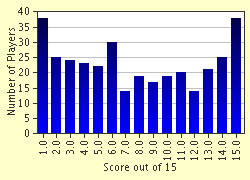Quiz Answer Key and Fun Facts
1. It's about four hundred years since I wrote my plays, and since then many of my lines (e.g. "All the world's a stage," "Brevity is the soul of wit,") have become proverbial. So I think I can safely say "I'LL MAKE A WISE PHRASE."
2. If you ever meet the women in my plays, don't expect a "VIRGINAL WELCOME." They're Restoration ladies, and usually involved in some kind of amorous intrigue. That's the way of the world, and it probably explains why I chose to remain an old bachelor.
3. "HE IS A TOP MAN." That's what revolutionary Americans said about me during the crisis of the 1770s. But eventually they found my common sense about the rights of man to be a bit too radical, and I died in poverty on my farm at New Rochelle. Where my bones are now, nobody really knows.
4. If you're looking for a "SCHOLARLY MATE," then I'm your man. I can tell you (at very great length) all about the French Revolution and Chartism and Oliver Cromwell, and I'm fluent in German. Just call at my house in Cheyne Row in Chelsea.
5. In the mid-nineteenth century I could almost claim to be a "PERSON WHOM ALL READ." Nowadays I'm mainly remembered for a quotation about a better mousetrap, and maybe a poem called "Brahma."
6. If you think that "I AM MERELY A WEAK CAT-LIKE CHAP," then think again. I'm 6 ft 4 in (193 cm) tall and big with it, and I learned to take care of myself at Charterhouse school (the Slaughterhouse, I called it). Neither is it fair to accuse me of vanity: I really am good, even if I've been overshadowed by my contemporary Charles Dickens.
7. Tabby Tom is unkind enough to think that "A REALLY SUBLIME TWIT" describes me well, but then, he doesn't have much feeling for the Celtic twilight. My verse will take you to Coole, Innisfree or Byzantium, and I'm also remembered for my commemoration of Easter, 1916.
8. Many people find my verse hard to understand: indeed, some say that I'm probably a certifiable lunatic or "REGISTERED NUT." Yet many of my detractors are happy to quote my line "Rose is a rose is a rose," or to describe some of my contemporaries in my words as the "Lost Generation."
9. "AH, HATE IS TRAGIC!" Indeed it is, but if there were no hatred in the world, there would never be a murder in the vicarage or on the Orient Express, and then what would there be for me to write about?
10. The world of my stories is very much a man's world, where the bell tolls for men without women, and the sun also rises as a prelude to death in the afternoon. In the 1930s I went big-game hunting among the green hills of Africa, where the locals certainly admired this "WHITE MAN'S ENERGY."
11. Where can you find me now? Probably "IN MERRY HELL," between the tropics of Cancer and Capricorn, though I've also spent some quiet days in Clichy.
12. I graduated from the New York Law School, but soon abandoned my legal career for the theatre: there I put people on trial, presented a street scene and looked at Judgment Day. Maybe my plays don't appear on Broadway or Shaftesbury Avenue as often as they did in my lifetime, but I hope I'm not just a "MERE RELIC."
13. Can I really be called a "HASTY OLD MAN?" Well, you might say I lived life in the fast lane, but I died when I was only 39. Following the poetic advice I gave to my father, I did not go gentle into that good night.
14. My two marriages ended in divorce, so presumably "MY GENIAL KISS" lost its appeal for Hilary and Elizabeth Jane. But my early comic novels like "Lucky Jim" remain popular.
15. "I LOVE DRAG!" So you might think if you know me only from my novel about a lady named Myra, who turns out to be not quite what she seems. But I've also written about historical figures from the Roman emperor Julian down to Abraham Lincoln, as well as some wise and witty essays on the modern American political and cultural scene.
Source: Author
TabbyTom
This quiz was reviewed by FunTrivia editor
bloomsby before going online.
Any errors found in FunTrivia content are routinely corrected through our feedback system.

